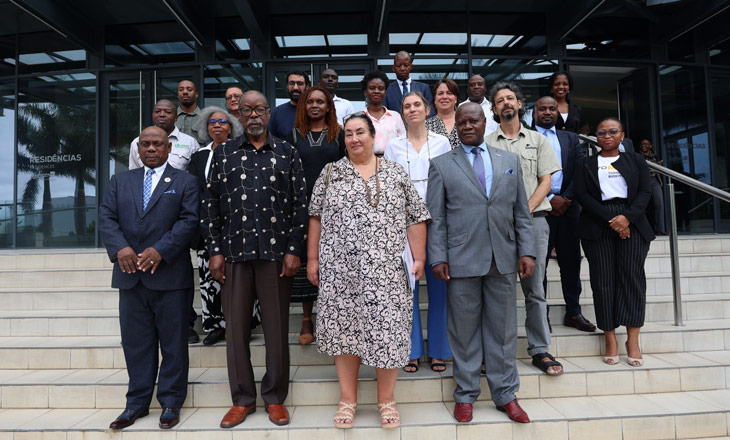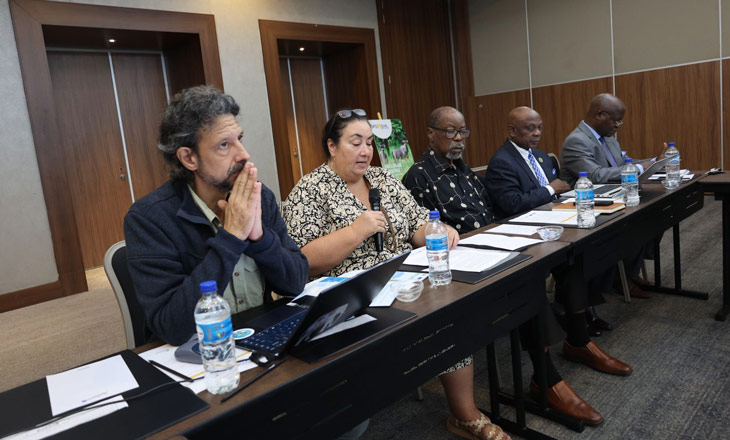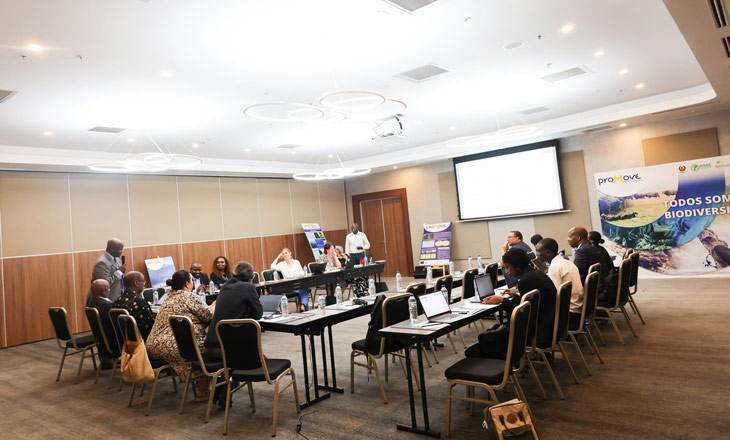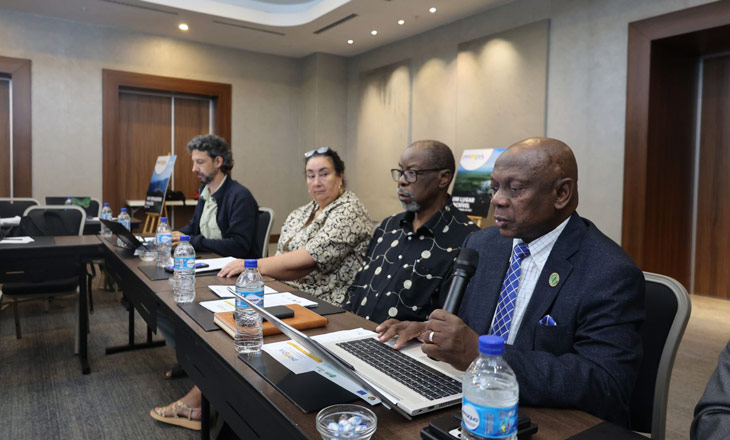On Wednesday, April 23, 2025, in the City of Maputo, the 4th Session of the National Supervision Committee – CNS of PROMOVE Biodiversidade took place. The event was led by the Office of the National Authorizing Officer (GON), in coordination with the National Administration of Conservation Areas (ANAC), the European Union, and the Foundation for the Conservation of Biodiversity – BIOFUND.
Published at 25/04/2025
PROMOVE Biodiversidade: Progress of Implemented Activities in the Provinces of Zambézia and Nampula
The meeting brought together around 34 participants, both in person and online, including the Plenipotentiary Minister of the GON, the Deputy Director General of ANAC, the Head of the European Union Delegation and the Executive Director of BIOFUND. Also present were CNS members from the provinces of Nampula and Zambézia, the District Services for Economic Activities of Lugela, Administrators of the Conservation Areas benefiting from the Programme, as well as implementing partners. Results on the progress of activities in all programme intervention areas were presented, along with the findings of the mid-term evaluation of PROMOVE Biodiversidade.
Conservation and Research on Mount Mabu: The Role of PROMOVE Biodiversidade
PROMOVE Biodiversidade has been instrumental in conservation and research on Mount Mabu. Through this support, the WWF-ReGeCom-RADEZA consortium collaborated with the local community to demarcate 9,300 hectares for conservation and submitted a proposal for the creation of a Community Conservation Area (CCA) to ANAC. Studies and scientific expeditions were carried out with the last one conducted in 2024 involving 25 scientists supported by around 100 community members. This latest expedition not only increased knowledge of biodiversity but also raised the international visibility of Mount Mabu.
Five potential value chains were identified: conservation agriculture, beekeeping, ecotourism, fish farming, and mineral water bottling. In this context, 200 beneficiaries produced 2.27 tons of agricultural products, and 72 beekeeping beneficiaries established 47 apiaries.
PROMOVE Biodiversidade: Conservation and Sustainable Development in Gilé National Park
In Gilé National Park (PNAG), PROMOVE Biodiversidade financed research essential to support management decisions and influence conservation policies.
RADEZA supported several value chains, including agriculture (with technology transfer through Farmer Field Schools), beekeeping, fish farming, poultry farming, building boreholes, and milling.
In addition, conservation efforts through the agreement with the FFS-IGF foundation allowed for an increase in the number of rangers, the modernization of law enforcement and ecological monitoring processes, and improvement of mobility. The translocation of 200 buffaloes to this conservation area contributed to the restoration of biodiversity in the park.
APAIPS: Protecting Marine Biodiversity with PROMOVE Biodiversidade
PROMOVE Biodiversidade support has been vital for the Primeiras and Segundas Islands Environmental Protection Area (APAIPS). The consortium led by WWF, together with AENA and Kulima, contributed to the rehabilitation, expansion, and equippment of the APAIPS offices; promoted the training and graduation of the first group of 47 rangers in the history of APAIPS, including former community agents. PROMOVE Biodiversidade also supported the development of livelihoods by investing in agriculture and fish processing value chains. Support extended to engaging Community-Based Organizations (CBOs) in community awareness, patrols, and monitoring, strengthening marine biodiversity conservation.
CITES Regulation Approved by the Government: ANAC Leads the Process
In addition to the activities promoted in the conservation areas, under the implementation agreement of one of the PROMOVE Biodiversidade components focused on strengthening ANAC’s institutional capacity, the CITES regulation was drafted and approved by the government. This represents a significant milestone in the protection of endangered species through the effective implementation of CITES guidelines, creating conditions for the country to ascend to a higher category.
ANAC also played a crucial role in strengthening the CITES Scientific Authority by involving more universities, organizing training for various sectors dealing with security affairs, and ensuring that international conservation standards are strictly followed. The drafting of Complementary Standards for Management Mechanisms for Community Conservation Areas is another important outcome of this component.
The Deputy Director General of ANAC highlighted the importance of collaboration between the government, international organizations, and local communities to ensure the sustainability of conservation areas.
The Executive Director of BIOFUND reaffirmed the organization’s commitment to working with all stakeholders and using the programme’s results to improve future conservation initiatives.
The Head of Cooperation of the European Union in Maputo expressed pride in the role of PROMOVE Biodiversidade in protecting biodiversity and promoting sustainable development of local communities and challenged all programme stakeholders to overcome difficulties to achieve the programme’s objectives. She particularly highlighted the generation of tangible benefits for local communities and effective responses to the recommendations of the mid-term evaluation of the programme, whose results were also shared at this event. This evaluation highlighted the need to adopt a strategic approach to implementation of livelihoods and ensuring generation of tangible benefits for the beneficiary communities.
PROMOVE Biodiversidade is funded by the European Union and implemented by BIOFUND and ANAC, with the aim of promoting institutional strengthening, biodiversity conservation, community development, and research to inform practical management actions. Three Conservation Areas in the provinces of Nampula and Zambézia benefit from this support, namely Gilé National Park (PNAG), the Primeiras and Segundas Islands Environmental Protection Area (APAIPS) and its adjacent coastal areas, and Mount Mabu.
The CNS provides strategic guidance for the programme, ensuring its alignment with national policies and strategies, as well as with the international commitments to which Mozambique is a signatory. In addition, CNS advises and monitors implementers and beneficiaries to achieve the desired results and impact of the programme.





